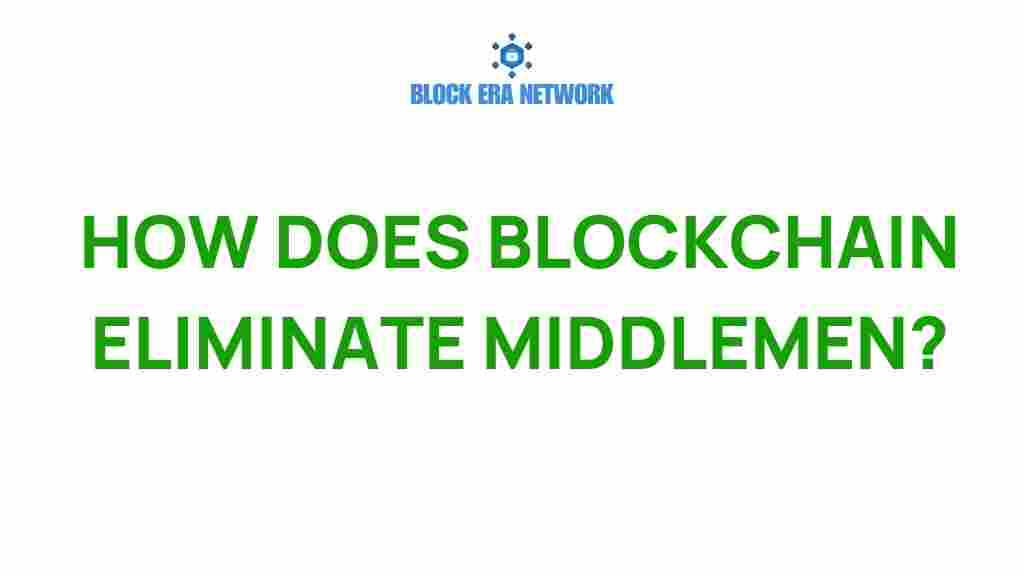How Blockchain Disrupts Traditional Systems by Eliminating Middlemen
In recent years, blockchain technology has emerged as a revolutionary force across various industries, challenging the status quo and disrupting traditional systems. Its ability to eliminate middlemen is particularly significant, as it fosters an environment of decentralization, innovation, and efficiency. This article explores the transformative impact of blockchain on finance and other sectors by enhancing trust and transparency.
Understanding Blockchain Technology
Blockchain is a decentralized digital ledger that records transactions across many computers in such a way that the registered transactions cannot be altered retroactively. This innovation ensures that all participants in a network have access to the same information, thereby fostering a sense of trust and transparency. Key characteristics of blockchain include:
- Decentralization: Unlike traditional systems that rely on central authorities, blockchain distributes control across a network, reducing the influence of middlemen.
- Transparency: All transactions are visible to participants, promoting accountability and reducing fraud.
- Efficiency: By automating processes and eliminating intermediaries, blockchain can significantly speed up transactions and reduce costs.
- Security: Data on a blockchain is encrypted and linked, making it extremely difficult to alter or hack.
The Role of Middlemen in Traditional Systems
Middlemen have long played a crucial role in various industries, acting as intermediaries between buyers and sellers. They facilitate transactions, provide services, and ensure trust between parties. However, this reliance on middlemen introduces several challenges:
- Higher Costs: Middlemen often charge fees for their services, increasing the overall cost of transactions.
- Delays: The involvement of multiple parties can slow down transactions, leading to inefficiencies.
- Lack of Transparency: Middlemen may not always provide clear information about fees and processes, creating distrust.
The Disruption of Traditional Systems
Blockchain technology disrupts traditional systems by removing the need for middlemen, which brings about numerous benefits:
1. Financial Services
The finance sector has been one of the most affected by blockchain technology, as it allows for peer-to-peer transactions without the need for banks or payment processors. This shift promotes:
- Lower Transaction Fees: By eliminating middlemen, users can save on fees typically charged by banks and financial institutions.
- Faster Transactions: Blockchain enables near-instantaneous transactions, unlike traditional banking systems that may take days to process.
- Increased Accessibility: People in underserved regions can access financial services without the need for a bank account.
2. Supply Chain Management
In supply chain management, blockchain enhances transparency and accountability. Each transaction is recorded on a public ledger, allowing stakeholders to track products from origin to destination:
- Improved Traceability: Companies can verify the authenticity of goods and ensure ethical sourcing.
- Reduced Fraud: With transparent records, it is more challenging for counterfeit products to enter the market.
- Enhanced Efficiency: Automating processes through smart contracts reduces delays and increases overall efficiency.
3. Real Estate Transactions
Blockchain can simplify real estate transactions by eliminating the need for escrow services and title companies:
- Streamlined Processes: Smart contracts can automate agreements, making transactions faster and more efficient.
- Increased Trust: All parties can verify ownership and transaction history on the blockchain.
- Lower Costs: Reduced reliance on intermediaries results in significant savings for buyers and sellers.
Step-by-Step Process of Blockchain Integration
Integrating blockchain into existing systems can seem daunting, but following a structured process can streamline the transition:
- Identify Use Cases: Determine where blockchain can add value by eliminating middlemen within your industry.
- Choose the Right Blockchain Platform: Select a platform that aligns with your business needs, such as Ethereum for smart contracts or Hyperledger for enterprise solutions.
- Develop a Prototype: Create a small-scale version of your blockchain application to test its functionality and gather feedback.
- Implement and Test: Roll out the application, monitor its performance, and make necessary adjustments.
- Scale Up: Once tested, expand the application across your organization or industry.
Troubleshooting Tips for Blockchain Implementation
While adopting blockchain technology offers numerous benefits, there can be challenges during implementation. Here are some troubleshooting tips:
- Ensure Stakeholder Buy-In: Engage all relevant parties early in the process to foster support and collaboration.
- Focus on Education: Provide training and resources to help users understand how to use the new technology effectively.
- Address Scalability Issues: Plan for increased transaction volumes and ensure your blockchain solution can handle growth.
- Stay Compliant: Keep abreast of regulatory changes to ensure your blockchain application complies with laws and standards.
Case Studies: Successful Adoption of Blockchain
Numerous companies have successfully integrated blockchain technology, showcasing its potential to disrupt traditional systems:
- IBM and Food Trust: IBM’s Food Trust blockchain enables transparency in the food supply chain, allowing consumers to trace the origin of their food and ensuring safety.
- De Beers and Diamond Tracking: De Beers uses blockchain to track diamonds from mine to market, ensuring authenticity and ethical sourcing.
- Ethereum and Decentralized Finance (DeFi): Ethereum has become the backbone of the DeFi movement, allowing users to lend, borrow, and trade without traditional banks.
Conclusion
Blockchain technology is reshaping industries by eliminating middlemen, fostering decentralization, and enhancing trust and transparency. As businesses recognize the benefits of efficiency and reduced costs, the adoption of blockchain will likely accelerate. By integrating this innovative technology, organizations can unlock new opportunities and pave the way for a more transparent, efficient, and decentralized future.
For more information on how to implement blockchain in your industry, visit this resource. Explore how blockchain can revolutionize your business processes and lead to a more efficient and trustworthy environment.
In summary, the shift towards blockchain technology is not merely a trend but a fundamental change in how we conduct transactions and share information. By understanding and leveraging this technology, businesses can stay ahead of the curve and thrive in an increasingly digital world.
This article is in the category Blockchain Basics and created by Block Era Network Team

1 thought on “How Blockchain Disrupts Traditional Systems by Eliminating Middlemen”